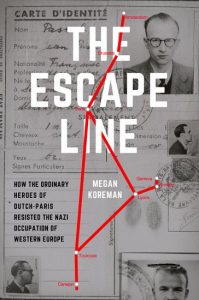
![]()
This lies just outside the scope of my mini-military hobby blog, I guess, so I thought I’d post a review here.
The Escape Line is an excellent book, telling the exciting story of ‘Dutch-Paris’, a clandestine group/line that ran from The Netherlands through Belgium and France to Switzerland and Spain, both sheltering and helping to escape Jews, downed Allied airmen, and others, such as young men fleeing conscription into German forced labour.
Johann or Jean Weidner (he chose to use the more French form of his name, being based in France) was a Seventh Day Adventist and textiles merchant who, along with his wife and an ever growing number of others, found himself drawn into a shady underworld, ostensibly at odds with his former standing as an upright law-abiding citizen, in order to help others and live in accordance with his own inner moral compass.
This well-written and researched book shines a light into this murky netherworld of underground but pacific resistance, which itself occurred during dark times. Finding funds, going on the lam, forging documents, crossing borders. There’s lot derring-do! Plenty of contemporary pictures and some useful maps help keep the whole thing both vivid and comprehensible. It’s very much a tale of ordinary people doing extraordinary things in extraordinary times.
A compelling page turner, set in Nazi-occupied Western Europe, the network and its stories spread their tentacles outwards from Weidner’s initial base in Lyons, France, to Switzerland and Spain, and up into Belgium and Holland. With characters such as couriers or hosts for fugitives ranging from young secretaries and mothers to elderly widows, and civilian passeurs, from French and Dutch clergy and businessmen to downed Allied airmen, Maquis resistance, Milice collaborators, the SS, SD, Gestapo and so on, it’s a very colourful cast.
It’s very interesting in respect of civil disobedience, and the potential conflict between individual conscience and the laws of the state. As Koreman says many times, most people during WWII in the occupied territories would rather look at the floor, so to speak, and try to just get through such troubled times without risking themselves.
In hindsight things at the tine of WWII can look simpler and more clear cut, in respect of an issue such as the persecution of Jews. But how can we apply such lessons as this story might impart for our own times? I have friends who are very active in helping refugees in the U.K. I have to confess I feel very conflicted about such issues as they are in the present.
I’ve got a huge stack of books to review, and was worried I’d find this a chore. But far from it. I was, rather appropriately, captivated, and felt compelled to continue. Indeed, it was hard to put down. I won’t go into any more detail here. Better that you read the book yourself.
